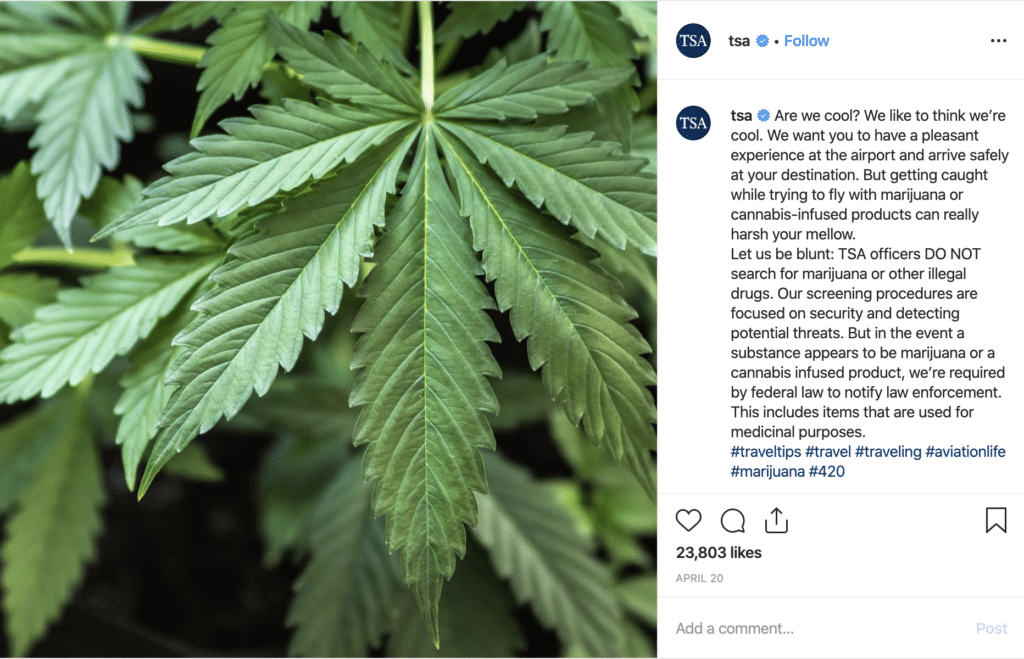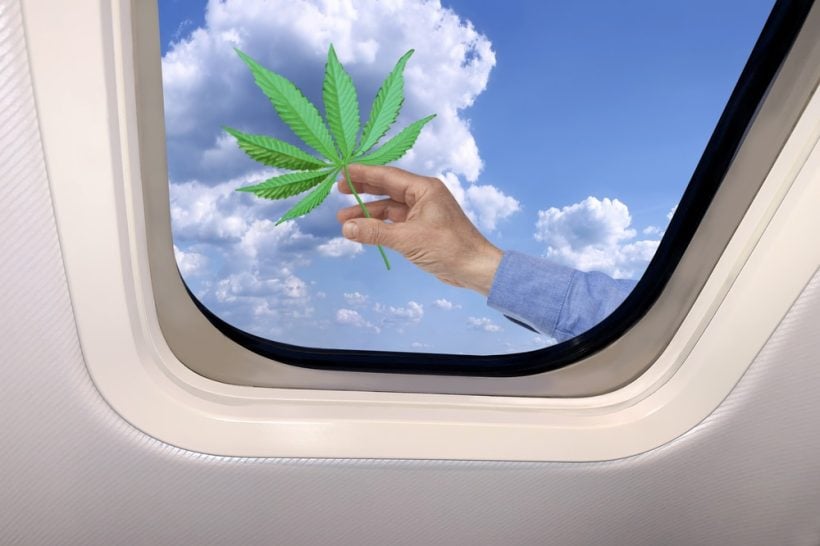Florida residents can legally receive medical marijuana treatment, but it requires that patients are savvy when it comes to traveling with their cannabis. This is especially relevant to those who need to transport their marijuana outside of Florida, with air travel having its own set of regulations. To avoid confusion and ensure the rule of law is followed, CannaMD is sharing those regulations so every Florida medical marijuana patient is well-informed.
Medical Marijuana: State vs. Federal Law
On a federal level, marijuana is classified as a Schedule I drug, meaning it shares a category with drugs such as heroin, LSD, and ecstasy. Although legal in Florida for medical necessity along with several other states, it is prohibited on a federal level which supersedes state law. This means that all medical marijuana patients must adhere to state laws and avoid crossing state lines, at which point federal laws apply. This rule applies even when traveling between two bordering states that both permit medical marijuana, such as Florida and Alabama.
For more information, see CannaMD‘s post: Can I Use My Medical Marijuana In States Where It’s Not Legal?.
Can I fly with medical marijuana in Florida?
The U.S. Department of Homeland Security Transportation Security Administration (TSA) does not search for marijuana, but if it’s found by chance, they are required by federal law to notify local law enforcement authorities. This applies to all marijuana, including small quantities prescribed for medical purposes. On April 20, 2019 (yep, 4/20), the U.S. Department of Homeland Security Transportation Security Administration (TSA) shared the following Instagram post:

The full TSA caption reads:
Are we cool? We like to think we’re cool. We want you to have a pleasant experience at the airport and arrive safely at your destination. But getting caught while trying to fly with marijuana or cannabis-infused products can really harsh your mellow.
Let us be blunt. TSA officers DO NOT search for marijuana or other illegal drugs. Our screening procedures are focused on security and detecting potential threats. But in the event a substance appears to be marijuana or a cannabis-infused product, we’re required by federal law to notify law enforcement. This includes items that are used for medicinal purposes.
The TSA website also includes some equally conflicting information, stating that medical marijuana is allowed in checked and carry-on bags under certain circumstances:

However, there are exceptions. From the TSA website:
Marijuana and certain cannabis-infused products, including some Cannabidiol (CBD) oil, remain illegal under federal law except for products that contain no more than 0.3 percent THC on a dry weight basis or that are approved by FDA. (See the Agriculture Improvement Act of 2018, Pub. L. 115-334.) TSA officers are required to report any suspected violations of law to local, state, or federal authorities.
TSA’s screening procedures are focused on security and are designed to detect potential threats to aviation and passengers. Accordingly, TSA security officers do not search for marijuana or other illegal drugs, but if any illegal substance is discovered during security screening, TSA will refer the matter to a law enforcement officer.
What happens if TSA finds your medical marijuana in a state where it’s legal?
According to Los Angeles Airport Police, which operates at Los Angeles International Airport and several other Southern California airports, not much:
Because it is not a crime.
As Lieutenant Mark Gonzales, airport police services bureau chief with the Orange County Sheriff’s Department, explains:
If the TSA calls us [about finding marijuana], we’d go up and make sure it is within the legal quantity. If it is, we’d just stand by while the passenger decides what to do with it. TSA may not want it to fly, but that doesn’t mean it is illegal in California.
Likewise, representatives from the Fort Lauderdale-Hollywood International Airport have said if passengers have the proper documents, medical marijuana is allowed. However, the Greater Orlando Aviation Authority Board has issued an anti-marijuana policy to avoid potential conflicts with the Federal Aviation Authority Board, which provides grants for Orlando International Airport (to receive grants, Orlando International Airport must comply with all federal laws).
According to Orlando airport lawyer Marcho Marchena:
The airport is basically wanting to make sure that if the federal government comes to make a determination that the airport is following all federal laws and regulations, we can say, ‘Here’s our policy, we are following federal law.’
Marchena also made it clear the airport itself does not do law enforcement. As the Orlando Sentinel notes:
Who would make an arrest, if anybody, is not clear.
TSA spokeswoman Sari Koshetz stresses that medical marijuana possession is not a pressing matter. If a large amount of marijuana is found during security checks, that discovery will be turned over to law enforcement, including possibly federal agents.
However, as Koshetz explains: Small amounts are referred to local authorities.
And for Orlando travelers, that’s a good thing. According to Orlando Police Department spokesperson, Michelle Guido:
The Orlando Police Department will take no action in the event that someone is lawfully carrying medical marijuana in accordance with Florida statute.
Moral of the story? You likely won’t go to jail if TSA finds legal marijuana in your bag before boarding, but – unless you want to throw away your medication or miss your flight – leave the cannabis at home.
When local law enforcement is called regarding a case of marijuana possession at an airport, the most they do is inspect the marijuana to ensure it’s within the legally allowed limits of 2.5 ounces per Florida statute 381.986. If so, they will defer to the passenger regarding what they choose to do with their cannabis. The Fort Lauderdale-Hollywood International Airport in Florida has even stated that passengers in possession of proper documentation for their medical marijuana will not be prevented from taking it on board their flight.
TSA Cannabis Controversy
In a little known controversy, the TSA temporarily allowed passengers to fly with medical marijuana – for an hour and 55 minutes.
At 9am on April 10, 2017, the TSA briefly changed their What Can I Bring? website page to feature a green “YES” by “medical marijuana”. The accompanying message read:
TSA security officers do not search for marijuana or other drugs. In the event a substance that appears to be marijuana is observed during security screening, TSA will refer the matter to a law enforcement officer.
However, when popular news outlet Leafly contacted the TSA for more details, the website quickly changed. At 10:55am the reference to medical marijuana disappeared completely. The change happened a few minutes after TSA public affairs manager Lorie Dankers provided Leafly with the following quote:
TSA’s response to the discovery of marijuana is the same in every state and at every airport – regardless of whether marijuana has been legalized in a state. TSA’s focus is on terrorism and security threats to the aircraft and its passengers. TSA’s screening procedures, which are governed by federal law, are focused on security and are designed to detect potential threats to aviation and passengers.
As has always been the case, if during the security screening process an officer discovers an item that may violate the law, TSA refers the matter to law enforcement. Law enforcement officials will determine whether to initiate a criminal investigation or what steps – if any – will be taken.
At 11:45am, “medical marijuana” reappeared on the website with its current rules/prohibition.
The TSA also supplied Leafly with the following information:
Marijuana remains an illegal substance under federal law.
The passenger’s originating and destination airports are not taken into account. Airport law enforcement will be notified if marijuana is discovered by a TSA officer during the security screening process of carry-on and checked baggage.
Whether or not the passenger is allowed to travel with marijuana is up to law enforcement’s discretion.
Can I fly back to Florida with medical marijuana from another state?
First and foremost, it’s important to check that the state where you’re purchasing medical marijuana has reciprocity with Florida, meaning they will accept your Florida medical marijuana card. Florida, for example, does not accept medical marijuana cards issued by other states.
As of November 2023, the District of Columbia and the following U.S. states accept out-of-state medical marijuana cards:
- Arkansas
- Arizona
- Hawaii
- Louisiana
- Maine
- Michigan
- Nevada
- New Hampshire
- New Mexico
- New Jersey
- Rhode Island
- Utah
- West Virginia
If attempting to purchase medical marijuana in any of these states, be sure to review the guidelines of that state. For example, West Virginia only offers reciprocity for terminal cancer patients. Arkansas has reciprocity, but visitors must sign up for the state’s medical marijuana program 30 days in advance and pay a $50 fee.
However, flying back to Florida from a state with reciprocity does not make it legal to fly with medical marijuana. Despite both states honoring your medical marijuana card, marijuana remains a Schedule I drug prohibited by federal law. The laws of both states are superseded by federal law.
Can I fly between cities in Florida with medical marijuana?
This is perhaps the grayest of gray areas when it comes to traveling with medical marijuana since a state border is not being crossed when flying from Jacksonville to Miami, for example.
However, federal law governs airplane travel. This makes it illegal to bring marijuana onto a plane, even if traveling with a medical marijuana card within a legalized state. The limitations noted above still apply, stipulating that “marijuana and certain cannabis-infused products, including some Cannabidiol (CBD) oil, remain illegal under federal law except for products that contain no more than 0.3 percent THC on a dry weight basis or that are approved by FDA.”
That being said, local law enforcement within Florida is unlikely to take action, as proven by this statement from Orlando Police Department spokesperson Michelle Guido:
The Orlando Police Department will take no action in the event that someone is lawfully carrying medical marijuana in accordance with Florida statute.
While prohibited, the biggest concern with flying with medical marijuana isn’t necessarily the illegality of it—it’s the delay caused due to the TSA’s requirement of alerting local law enforcement. For this reason, it’s imperative that you have your medical marijuana card in your possession if you attempt to fly with any amount of cannabis.
The Final Word
Marijuana, even if prescribed for medical purposes, remains illegal under federal law. The TSA operates under federal regulations whether traveling between states or within the state of Florida. A passenger’s origination and destination city, or reciprocity with another state, is not considered since federal law applies. Whether or not you are permitted to board with your medical marijuana is a gamble, with the decision ultimately left to responding law enforcement.
